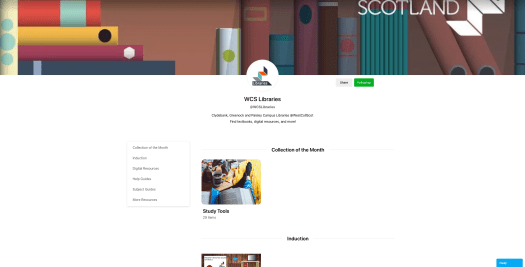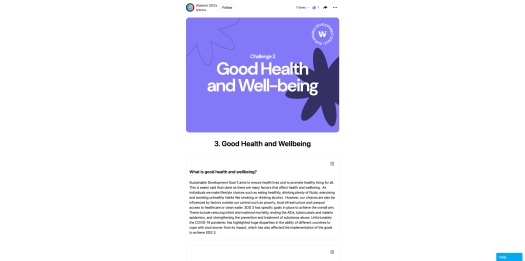In our library, Wakelet is an essential tool that enables the library team share visually engaging and contextually relevant collections of curated resources with students and staff in our college. Wakelet has become our go-to platform for its intuitive design, versatility, built-in accessibility, and ease of use.

Wakelet can be used to enhance library services in many other ways including:
- Collaboration
- Information and digital literacy
- CPD
- Advocacy
Collection, curation, dissemination
The acquisition and delivery of accessible, relevant resources to support the college curriculum is a core aspect of my role as a librarian in Further Education (FE). No matter what subject area, it is important to guide students towards high quality, current and accurate information. The first lockdown in March 2020 caused an abrupt switch to digital-only resources. Although we supplied access to online databases, eBook, and video collections, many students still preferred using physical books and teaching staff would request print copies of textbooks for our collections. Our library catalogue couldn’t be accessed remotely, the interface wasn’t very user-friendly, and it wasn’t possible to search through both print and digital collections from a single platform. How could we provide students with the resources and support they needed for online learning from home?
Enter Wakelet! I had initially used Wakelet to collect tweets from a training event but quickly realised that organising resource links into categories would provide a single point of access to our digital resources. Adding login instructions, step-by-step videos, and contact information would help anyone needing further assistance accessing those resources. Another plus was the ease of sharing the collection in multiple ways – emailing the link to curriculum staff, adding Wakelet tabs to channels on Microsoft Teams, embedding the collection into Moodle, and posting links and QR codes on our library webpages and social media accounts. My colleagues quickly embraced the benefits that Wakelet could bring and our use of Wakelet has quickly grown from this first collection to a wide range of subject guides covering the college curriculum, a library space where the whole team collaborates, and our public profile WCS Libraries. Our profile now hosts a library induction guide, curriculum subject guides, help guides for different platforms, and themed guides on subjects including climate change, mental health and wellbeing, LGBTQIA+, black history month and international women’s day.

Collaboration
In addition to collaborating within my own team, we have set up collaborative collections both within and outwith our college. A collaborative collection was set up to allow students to submit entries to the Visions for the Future competition, held as part of our Book Week Scotland 2020 events. This collection now acts as a showcase for the fantastic work that was entered.

Library staff across Scotland’s colleges contributed to the Keep the heid and read! campaign, celebrating the power of reading, libraries and mental health. The idea to create a collaborative collection of favourite mood-boosting reads was suggested at our Librarians’ and Information Services Network by Hilary Reid, Librarian at Ayrshire College. I volunteered to create a collaborative collection to which college library staff could contribute, along with some step-by-step instructions for those not familiar with Wakelet. Once finished this was shared more widely with college students, staff and on social media for Scotland’s Reading Moment on 11th May 2022. Wakelet supplied a simple and successful way for college library staff across Scotland to collaborate, and it was fantastic to watch the collection grow as more suggestions were added.

Information and Digital Literacy
Supporting the development of information literacy and digital literacy are also core aspects of the library’s role. Our subject guides introduce students to a variety of resources, including eBooks, online journals and newspapers, videos and more resources suggested by the Library Team. When delivering workshops via Microsoft Teams, we can present using the relevant Wakelet subject guide, delving deeper into resources specific to the area of study. I always emphasise to students that the guides only provide a starting point for their research, showing how to evaluate information when searching further. My colleagues have also developed a Study Tools guide, bringing together resources on evaluating information, citation and referencing, and plagiarism, and this has been embedded into each subject guide. This year I plan to introduce the Wakelet Student Ambassador program, to help students improve both their information and digital literacy skills. The Wakelet Community has shown the benefits for students and having heard how Ambassadors such as Deborah Zeman have facilitated this, proves that the library is the natural place to host the program.
CPD
Wakelet has encouraged me to further my own professional development, not only by attending webinars, but also delivering my own presentations on using Wakelet to my colleagues at West College Scotland and the wider library community. Monthly Community Leader and Ambassador webinars keep us updated on new developments and features on Wakelet , bringing advance news of new integrations with tools such as Canva and Mote or new features on the platform. Applying to become a Wakelet Ambassador is one of the best things I’ve done because it has brought many opportunities such as being asked to contribute to the Wakelet SDGs collection, and taking part in this year’s Wakelet Community Week 12-hour Livestream, an amazing if slightly stressful experience! My confidence in delivering training and presentations, which I’ve always found nerve-wracking, has increased. I have also been able to connect with other Community members across the world, not to mention just down the road in Glasgow! Learning from other members of the Community is a wonderful experience, my own knowledge and practice having greatly improved since becoming part of the Wakelet Wave!


Advocacy
A key takeaway from this year’s Community Week was using Wakelet for advocacy. No matter what sector you’re based in, libraries always seem under threat, from decreasing budgets to the misapprehension of what libraries and librarians do. When cuts are made, libraries are often one of the first services to be targeted but does this really save money? From school to college, and in the community, librarians inform the development of literacy and critical thinking, equipping students to evaluate information and think for themselves. We support the development of digital skills, often being the first point of contact when people need help. No matter where they are based, libraries deliver vital services for their communities, not least a safe space for those who need it.
Kristina Holzweiss and Deborah Zeman’s session at Community Week, Creating a Legendary Library with Wakelet, has inspired me to use Wakelet illustrate what the library has achieved during the academic year. Bringing together a variety of evidence, including social media posts, statistics, photographs of library events and comments from library users, in a Wakelet collection is perfect for this. By adding context, Wakelet allows you to tell the story of your library backed up with evidence, and this is now more important than ever.
All this… and more!
Wakelet has proven to be the ideal platform for enhancing our library services, allowing us to be innovative and creative. The platform is constantly evolving in response to feedback and suggestions from the community. Moreover, the support that the Wakelet Team gives is second to none. Jump in, get creative and find out how Wakelet can work for your library!

